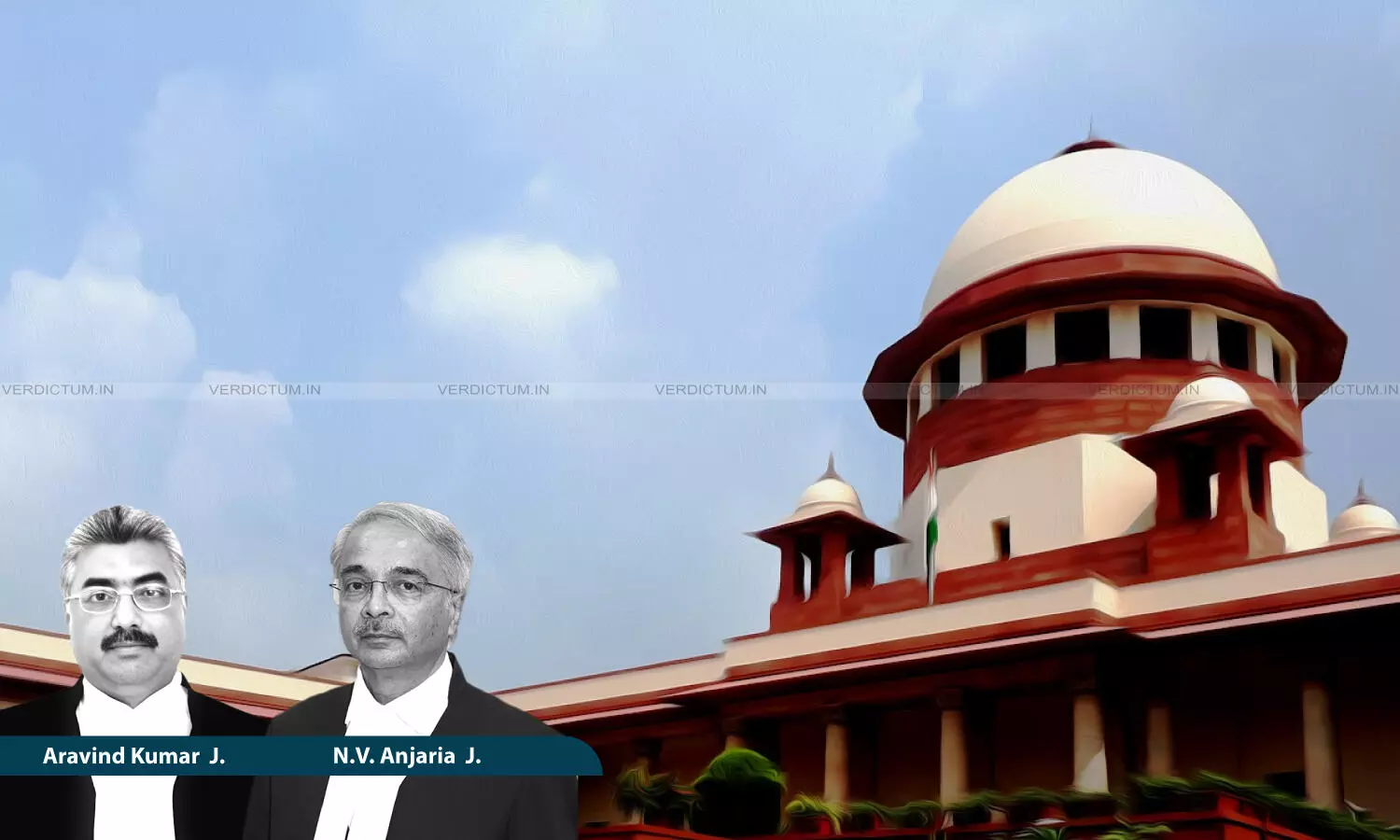
Justice Aravind Kumar, Justice NV Anjaria, Supreme Court
Word Spreads Faster Than Wind About Daughter-In-Law’s Harassment: Supreme Court Acquits Mother-In-Law In Section 498A IPC Case
 |
|The appeal before the Apex Court was filed by a woman convicted for the offence punishable under Section 498-A of IPC.
While acquitting the mother-in-law of a deceased woman in a case of dowry harassment registered under Section 498-A of the IPC, the Supreme Court observed that the word spreads faster than the wind about a daughter-in-law being harassed for dowry by the parents-in-law. The Apex Court took into consideration the deposition of the neighbour.
The appeal before the Apex Court was filed by the appellant convicted for the offence punishable under Section 498-A of IPC.
The Division Bench of Justice Aravind Kumar and Justice N.V. Anjaria said, “Our view also gets fortified by the fact that the neighbour of the appellant who was examined as DW-1 has deposed that appellant had never made any demand for dowry. She also deposed that the deceased had informed her of not keeping well. She being neither the relative of the appellant nor belonging to the same community to which the appellant belongs would indicate that there was no interest in her to depose against the factual matrix or in favour of the appellant. Her evidence having been brushed aside by the trial court and also High Court on the premise that she could not have deposed any fact with regard to the demand of dowry as it happens within the four walls is an erroneous finding particularly in such matters the word spreads faster than the wind about a daughter-in-law being harassed for the dowry by the parents in law.”
Advocate Rajesh Pathak represented the Appellant while Advocate Saakshi Singh Rawat represented the Respondent.
Factual Background
The Appellant’s son married the complainant’s daughter according to Hindu customs and rites about a year before her death in the year 2001. The complainant alleged that his daughter was found dead inside the matrimonial home, and only the accused persons were present in the house. It was also stated in the complaint that the daughter had committed suicide by hanging herself. It was further alleged that she was pregnant at the time of her death and further stated that deceased used to inform that her mother-in-law was commenting on her sarcastically for dowry. It was also stated by the complainant that his son-in-law was out of the city on professional work in Mumbai. The said complaint came to be registered for the offences punishable under Sections 498- A and 304-B of IPC.
The father-in-law, mother-in-law and brother-in-law of the deceased were arraigned as accused, and the trial court framed the charge for the offences under Sections 304-B, 498-A and an optional charge under Section 302 read with Section 34 of IPC. The Sessions Judge held that the charge of Section 302 read with Section 34 of the IPC and the charge of Section 304-B were not proved against all the accused. However, the second Accused – Mother-in-law (Appellant) was convicted for the offence punishable under Section 498-A of IPC. The High Court affirmed the judgment of the judgment of the sessions court.
Reasoning
The Bench explained that as per Section 498-A whoever, being the husband or the relative of the husband of a woman, subjects her to cruelty would be liable to be punished with imprisonment for a term which may extend to three years and also liable to fine.
“Demand for dowry in any form is itself sufficient for Section 498-A of IPC being attracted. Demand made in any form either by the husband or by the relative of the husband would also attract Section 498-A of IPC. Even if the demand exhibits the conduct that would likely to drive the said woman being unable to bear such conduct would attract Explanation (a). Likewise, harassing of a married woman with a view to coercing her or her relative to meet any unlawful demand would also fall within the mischief of the expression ‘cruelty’”, the Bench stated.
On a perusal of the deposition of the complainant, the Bench noted that his deposition did not indicate any such demand for dowry having been made or the deceased having been inflicted with cruelty to drive her to commit suicide. The deposition of the deceased’s mother also did not inspire any confidence in any person of common prudence to conclude that, on account of either harassment for dowry or on account of demand for dowry made by the appellant she had been forced to commit suicide. The brother of the deceased also admitted that there was no demand for dowry made before marriage, and the marriage was solemnised happily and properly, and he expressed that his sister might have been murdered only based on the doubt.
The doctor who conducted the post-mortem opined that the cause of death appeared to be asphyxia on account of strangulation. He admitted that if there was strangulation, then the possibility of injuries being suffered to other parts of the body was possible. Reference was also made to the deposition made by the neighbour of the appellant, stating that the appellant had never made any demand for dowry.
Thus, allowing the appeal, the Bench set aside the judgment of the High Court and acquitted the accused of the offence under Section 498-A of IPC.
Cause Title: Bhasmt. Bhagwati Devi v. State of Uttarakhand (Neutral Citation: 2025 INSC 1051)
Appearance
Appellant: Advocate Rajesh Pathak, AOR Sanjeet Kumar Trivedi
Respondent: Advocate Saakshi Singh Rawat, AOR Sudarshan Singh Rawat